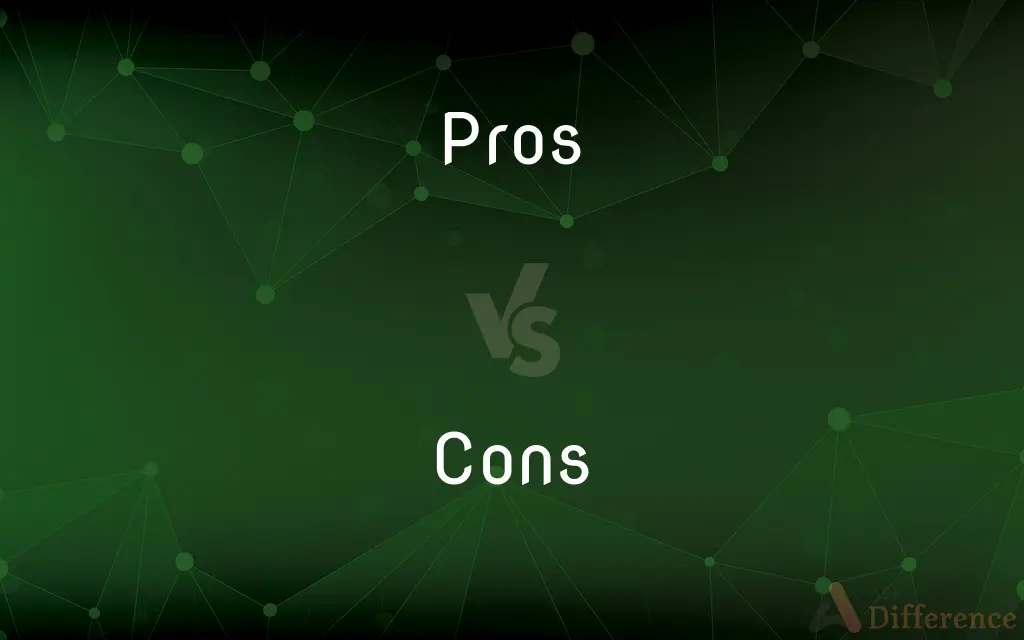Pros vs. Cons — What's the Difference?
By Tayyaba Rehman — Published on January 8, 2024
Pros are the advantages or positive aspects, while Cons are the disadvantages or negative aspects.

Difference Between Pros and Cons
Table of Contents
ADVERTISEMENT
Key Differences
In evaluating decisions, "Pros" refer to the positive aspects that support taking a particular action. They are the beneficial factors that make an option appealing. Conversely, "Cons" denote the negative attributes that count against the action. They are the potential drawbacks or risks that may deter one from proceeding.
"Pros" are the favorable points that can lead to positive outcomes, such as increased efficiency, profitability, or satisfaction. In contrast, "Cons" represent the unfavorable points that could result in negative consequences, like costs, complications, or dissatisfaction. Both pros and cons are considered to weigh the overall worth of a decision.
When presenting arguments, "Pros" are used to outline the strengths or benefits that an idea or proposal may possess. On the flip side, "Cons" are utilized to highlight the weaknesses or detriments associated with the proposal. Both are essential in a balanced discussion or analysis.
In decision-making, the "Pros" of an option might include factors such as cost savings, time efficiency, or long-term gains. "Cons," on the other hand, might involve considerations such as initial expense, time investment, or potential risks. Assessing both is crucial to informed decision-making.
Lastly, the term "Pros" is derived from the Latin word "pro," meaning "for," indicating a stance in favor of something. "Cons" comes from the Latin "contra," meaning "against," suggesting opposition. These terms are universally used to represent the two sides of a debate or choice.
ADVERTISEMENT
Comparison Chart
Grammar Usage
Positive connotation
Negative connotation
Implication
Suggests benefits
Suggests drawbacks
Decision Influence
Encourages action
Discourages action
Argumentative Weight
Strengthens a case
Weakens a case
Emotional Impact
Inspires optimism
Prompts caution
Compare with Definitions
Pros
Pros are the positive attributes of an argument or situation.
The pros of remote work include flexibility and comfort.
Cons
Cons refer to the arguments against a particular course of action.
The cons of skipping breakfast include decreased concentration.
Pros
Pros are the positive factors considered in decision-making.
The pros of buying a house now might outweigh the cons due to the market conditions.
Cons
Cons are the negative aspects or disadvantages of an argument or situation.
The cons of the plan were too costly to ignore.
Pros
Pros refer to the reasons in favor of doing something.
The pros of pursuing higher education often include better job prospects.
Cons
Cons are the unfavorable factors in a debate or choice.
The cons of investing in this stock outweigh the potential gains.
Pros
Pros are the supportive arguments in a debate.
The pros of the new policy are that it could reduce unemployment.
Cons
Cons are used to express the disadvantages in a debate.
The cons of deregulation might lead to less consumer protection.
Pros
Pros can mean the advantages or benefits of a particular choice.
One of the major pros of electric cars is their environmental friendliness.
Cons
Cons can mean the drawbacks or detriments that come with a decision.
Among the cons of urban living is the constant noise.
Common Curiosities
Can the number of "Pros" and "Cons" be equal?
Yes, but their weight or impact might differ.
How do "Pros" and "Cons" affect decision-making?
They help weigh the benefits and drawbacks of options.
Are "Pros" always more important than "Cons"?
No, the importance varies with context and perspective.
What do "Pros" and "Cons" represent?
Pros are positive aspects, while Cons are negative aspects.
Can "Pros" and "Cons" be subjective?
Yes, what's pro for one might be a con for another.
Is it possible to have only "Pros" or only "Cons"?
Rarely, as most choices have both positive and negative aspects.
Can "Pros" become "Cons" over time, and vice versa?
Yes, as circumstances and perspectives change.
Can "Pros" and "Cons" change with additional information?
Absolutely, new information can shift the balance.
Is there a systematic way to evaluate "Pros" and "Cons"?
Yes, methods like cost-benefit analysis are used.
How can one effectively communicate "Pros" and "Cons"?
Through clear, balanced, and factual arguments.
Do "Pros" and "Cons" apply to all types of decisions?
Yes, from everyday choices to major business decisions.
Should "Pros" and "Cons" be considered logically or emotionally?
Ideally, both aspects should be considered.
Do "Pros" and "Cons" influence group decisions differently than individual ones?
Yes, group dynamics can affect the interpretation of pros and cons.
Do "Pros" and "Cons" always lead to a clear decision?
Not always, as some decisions involve complex trade-offs.
Are "Pros" and "Cons" culturally dependent?
Yes, cultural values can influence what is considered pro or con.
Share Your Discovery

Previous Comparison
2 Pole Motors vs. 4 Pole Motors
Next Comparison
RGB vs. CMYKAuthor Spotlight
Written by
Tayyaba RehmanTayyaba Rehman is a distinguished writer, currently serving as a primary contributor to askdifference.com. As a researcher in semantics and etymology, Tayyaba's passion for the complexity of languages and their distinctions has found a perfect home on the platform. Tayyaba delves into the intricacies of language, distinguishing between commonly confused words and phrases, thereby providing clarity for readers worldwide.
















































